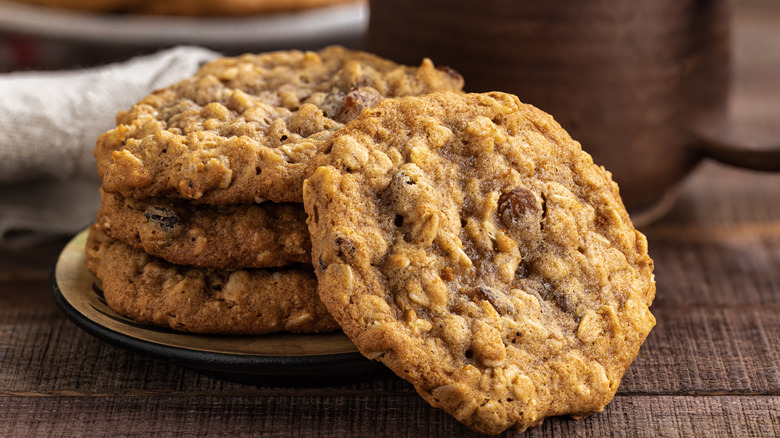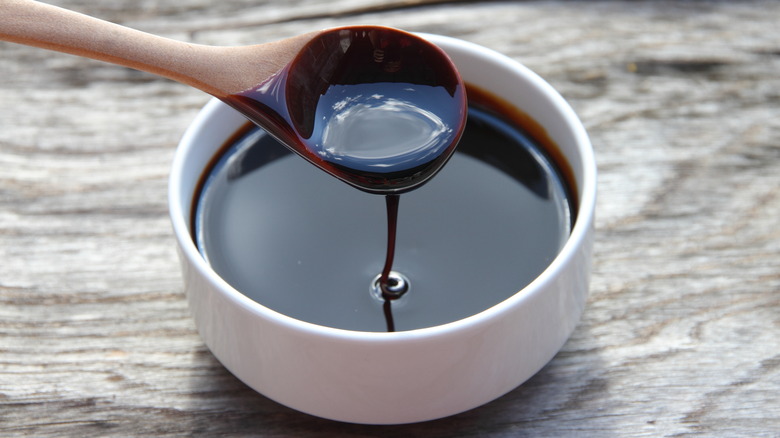The Syrupy Ingredient That Totally Enhances Oatmeal Raisin Cookies
From childhood through adulthood, cookies are a tried-and-true dessert that we likely never stop craving. Whether chocolate chip, snickerdoodle, or grandma's famous birthday cake cookies, there's no wrong way to enjoy a freshly baked cookie. There is, however, one cookie that is controversial among dessert enthusiasts: oatmeal raisin. We love oatmeal raisin cookies, but we totally understand why someone wouldn't. After all, what are wrinkly grapes and dry steel-cut oats doing in a batch of indulgent, candied cookies? The combination doesn't exactly scream Willy Wonka's chocolate factory.
But suppose you're an oatmeal raisin skeptic or a peddler of the lesser-loved cookie varieties looking to convince the haters that it deserves a spot in their cookie rotation. In that case, we've got just the solution — molasses. Molasses adds a deep, rich sweetness to oatmeal raisin cookies that's not as simple or one-dimensional as plain granulated sugar. With a distinct caramel-like flavor and subtle hints of toffee and spice, the luxurious complexity of molasses enhances the overall flavor profile of oatmeal raisin cookies, giving each bite a more exciting and less cloying feel.
The natural spiciness of molasses is reminiscent of ginger and cloves, which pairs well with the warm aromatics often used in an oatmeal raisin cookie recipe, like cinnamon and nutmeg. Molasses retains moisture, which gives your batch of oatmeal raisin cookies a soft, chewy center without compromising that irresistible exterior crunch.
What is molasses and where can you find it?
You might think molasses is just maple syrup or some kind of tree sap — close, but no cigar! Molasses is a thick, dark, syrupy byproduct of the sugar refinement process. Sugar cane or sugar beets are pressed to extract a juice that is heated until crystals form, producing molasses. The crystals are removed from the solution, and the thick, sticky liquid that remains is molasses — science!
There are several types of molasses, each with varying degrees of sweetness and bitterness, depending on how many times the refinement process has been repeated. The three main types of molasses are light, dark, and blackstrap molasses. Thanks to its sweet, dulcet flavor, light molasses is the most commonly used variation in baking, and it's also your best option for sweeting up oatmeal raisin cookies. Dark molasses is equal parts sweet and bitter, giving your oatmeal raisin cookies a slightly less candied taste with an intriguingly edgy bite. Blackstrap molasses is pointedly bitter and works best with savory dishes, so it's best to skip this variety when making oatmeal raisin cookies.
Although you can make molasses from the comforts of your own kitchen, it's a widely available ingredient at most supermarkets. You can find molasses in the baking section of your local grocery store, and if you can't access it in-store, dozens of brands sell it online.
Molasses versus other sweeteners
Now that you're sold on the glory of molasses-kissed oatmeal raisin cookies, you may wonder how it stacks up to other sweeteners. Although good old-fashioned white sugar is the quintessential convection sweetener, it doesn't offer the same depth as molasses. With its funky, nuanced flavor and comforting warmth, molasses exudes a confidence that plain white sugar just doesn't have. Brown sugar, however, actually has traces of molasses in its DNA, which makes it a great substitute for molasses if you don't have the sticky stuff on hand. Unfortunately, brown sugar doesn't have the same pronounced complexity as mother molasses. Since molasses is a viscous sweetener, it will bring a much-desired moisture to your oatmeal raisin cookies that's harder to achieve with dry sugars. What about other liquid sweeteners like honey and maple syrup? While both options add moisture to your oatmeal raisin cookies, neither is as intricate as molasses. Honey has an aromatic floral flair that's vibrant like a blossoming garden, while maple syrup has an earthy, sweet, yet one-dimensional flavor.
Unlike many common sweeteners, molasses is rich in vitamins and minerals that can add a nutritious twist to oatmeal raisin cookies. Be careful, though; it's still considered an added sugar, and you should moderate your intake of sweet additives. When it comes to molasses, the real kicker is that it has a deep, flavorful brilliance and imparts a scrumptious moisture that livens up dry, boring oatmeal raisin cookies.


